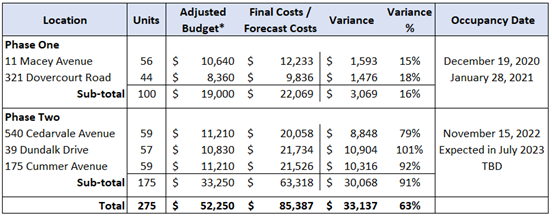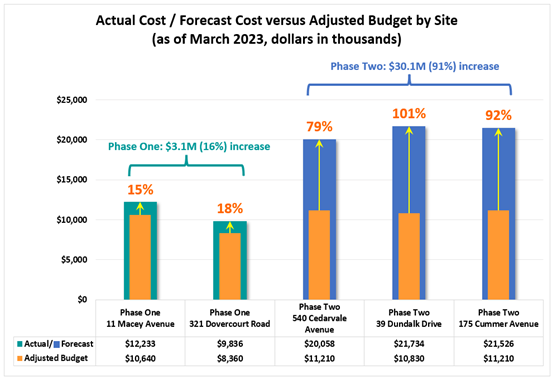Why This Audit Matters
The Modular Housing Initiative is an innovative opportunity for the City to respond rapidly to Toronto’s urgent homelessness situation and to reduce pressure on its shelter system. Proper oversight and management of the Modular Housing Initiative is critical to ensure the projects are on time and on budget.
Background
In April 2020, as an urgent response to the housing need for people experiencing homelessness, particularly during the COVID-19 pandemic, and to expediate action under the HousingTO Plan, City Council directed City staff to launch the Modular Housing Initiative to create 250 new modular supportive homes as quickly as possible.
The Modular Housing Initiative has two phases (Phase One and Phase Two) and was initially estimated to cost $47.5 million, funded by the City and the Canada Mortgage and Housing Corporation. The Housing Secretariat oversees the Modular Housing Initiative, while the Corporate Real Estate Management (CREM) Division manages the construction projects and contractor’s performance. CreateTO chose the sites and procured the builder.
By The Numbers
- 5 to 13 months – the time that modular housing units were ready for occupancy after the construction start date
- 159 units – completed at 3 locations out of a total planned number of 5 locations and 275 units
- $33M (63%) over adjusted budget overall versus actual/forecast project costs, and expected to increase further
What We Found
A. Better Project Planning Before Budget Preparation
- Some project planning and due diligence work on project sites was not completed until after the budget was prepared. As a result, site preparation costs were not considered when staff developed the budget, leading to costly change orders during construction.
- City staff informed us that to achieve the aggressive timeline required by the federal funding provider, they had to make decisions quickly and fast-track the projects as much as possible, which gave them less time for due diligence and project planning.
B. Strengthening Tracking, Monitoring, and Reporting of Project Costs
- In some instances, the various stakeholders did not have a clear understanding of roles and responsibilities, which contributed to inconsistencies and/or gaps in the monitoring of some of the project funding, budgets and costs.
- Project budgets and costs for modular housing were divided across many accounts in the City’s financial system, making it difficult to track and monitor project costs-to-date for each project site.
- Staff did not give regular reports about detailed budget increases, cost escalations, and variance analysis to City Council.
C. Improving Contract Management and Review of Change Orders
- For Phase One, staff were unable to provide evidence that they reviewed change orders prior to paying the contractor. We noted an improvement in Phase Two, where staff reviewed supporting documents for change order work prior to payments.
- To meet tight timelines and avoid delays, staff allowed the contractor to proceed with change order work without first receiving approval from CREM. This led to disagreements with the contractor over the scope of work and additional costs.
- Staff advised that on-site inspections were performed by CREM on the work progress, but these were not documented, so we could not verify them.
- Formal contract and project management policies and procedures have not been established by CREM or the Housing Secretariat.
How Recommendations Will Benefit the City
Implementing the 20 recommendations contained in this report will help the City to strengthen controls over project planning, budgeting, cost tracking, and contract management processes of modular housing, and enhance the quality of reporting to City Council. In particular:
- Better project planning and a more informed budget can help reduce the risk of potential delays and costs.
- Strengthening the tracking, monitoring, and reporting of project costs will help stay on budget and improve accountability and transparency.
- Improving contract management and processes to review change orders will help the City receive the services it has contracted for within the required budget and timeline.
Status of Phase One and Phase Two Projects (Dollars in thousands)
The two Phase One projects were completed and ready for occupancy 5 months after the construction start date. 540 Cedarvale Avenue was completed and ready for occupancy 13 months after the construction start date.

Overall, we found that insufficient planning, unbudgeted site preparation costs and change orders, all contributed to the significant cost increase between the adjusted budget and the actual/forecast project costs. The cost increase was also from inflation, and global supply chain and labour shortage issues due in part to the COVID-19 pandemic.
The original Council-approved budget was $47.5 million based on 250 units at a funding rate of $190,000 per unit. The number of units was later revised by the Housing Secretariat to 275 units. For the purposes of cost variance analysis, we multiplied the revised units by $190,000 to arrive at the adjusted budget of $52.3 million.

Scope Limitations
For our first objective on procurement, we were limited in scope to fully conclude due to a lack of available documentation supporting the procurement decisions.
For our third objective, we were unable to conclude whether modular housing construction results in faster delivery and lower costs than traditional construction due to a lack of complete overall cost information and benchmarking information.